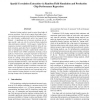Free Online Productivity Tools
i2Speak
i2Symbol
i2OCR
iTex2Img
iWeb2Print
iWeb2Shot
i2Type
iPdf2Split
iPdf2Merge
i2Bopomofo
i2Arabic
i2Style
i2Image
i2PDF
iLatex2Rtf
Sci2ools
123
click to vote
DATE
2008
IEEE
2008
IEEE
Spatial Correlation Extraction via Random Field Simulation and Production Chip Performance Regression
Statistical timing analysis needs a priori knowledge of process variations. Lack of such a priori knowledge of process variations prevents accurate statistical timing analysis, for which foundry confidentiality policy has largely been blamed. A significant part of process variations are design specific, and can only be extracted from production chip performance statistics. In this paper, I adopt the homogeneous isotropic random field model for intra-die random variations, apply fast Fourier transform (FFT) to simulate a homogeneous isotropic random field, obtain corners for Monte Carlo SPICE simulation of timing critical paths in a VLSI circuit, and apply regression to match production chip performance statistics. Experimental results based on a timing critical path in an industry design with 65nm Predictive Technology Models reveal constant mean, increased standard deviation, and decreased skewness of a signal propagation path delay as spatial correlation increases. The proposed...
| Added | 29 May 2010 |
| Updated | 29 May 2010 |
| Type | Conference |
| Year | 2008 |
| Where | DATE |
| Authors | Bao Liu |
Comments (0)

